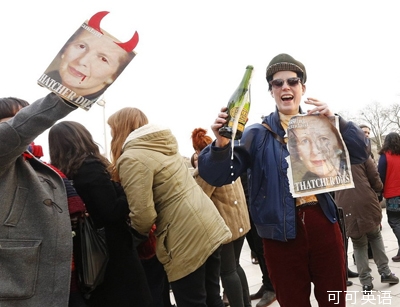
事后來(lái)看,冷戰(zhàn)的結(jié)果似乎是不可避免的。但上世紀(jì)八十年代的大部分時(shí)間,撒切爾都需要忍受共產(chǎn)黨的同情者和“有用的白癡”們的指責(zé):相信單邊裁軍的人,他們樂意看到蘇聯(lián)在歐洲主導(dǎo)中程核力量;倡導(dǎo)“趨同理論”(convergence theory)的人,他們堅(jiān)持認(rèn)為北約國(guó)家和華約國(guó)家在漸漸地和平趨同(不管有沒有奇怪的古拉格勞改營(yíng))。
Above all, however, Thatcher was right about Europe. She was right to push Europe in the direction of real free trade by backing and signing the Single European Act of 1986. Yet she was equally right to oppose the idea of a single European currency.
然而,無(wú)論如何,撒切爾關(guān)于歐洲的看法是正確的。通過支持并簽署1986年《單一歐洲法案》切實(shí)推動(dòng)歐洲走向貿(mào)易自由,她的做法是正確的。反對(duì)單一歐洲貨幣構(gòu)想也同樣是正確的。
On this issue, the Financial Times, as well as a great many other respected publications, owes Thatcher not only the respect due to a great leader, but also an apology. Throughout the 1980s, many critics consistently heaped opprobrium on her for resisting the efforts of her own cabinet to get sterling into the European exchange rate mechanism.
在這個(gè)問題上,英國(guó)《金融時(shí)報(bào)》,以及其他很多受尊敬的出版物,不僅欠撒切爾這位偉大領(lǐng)導(dǎo)人應(yīng)有的尊重,也欠她一聲道歉。整個(gè)八十年代,很多批評(píng)者都因?yàn)樗磳?duì)自己的內(nèi)閣將英鎊納入歐洲匯率機(jī)制的努力,不斷地對(duì)她大加抨擊。











